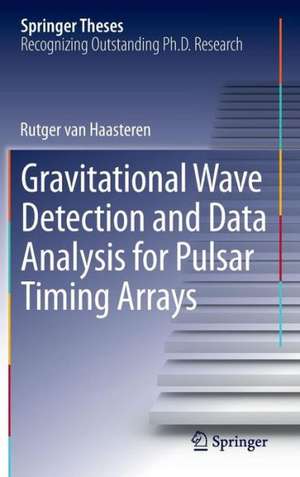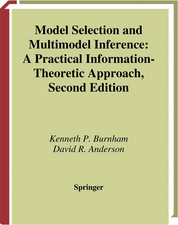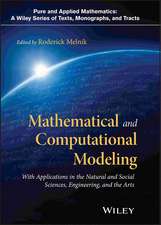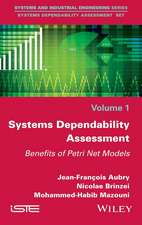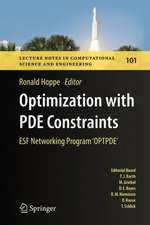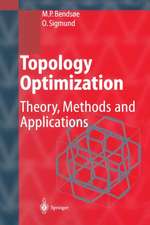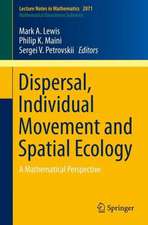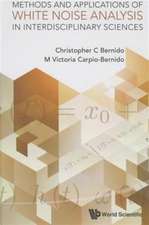Gravitational Wave Detection and Data Analysis for Pulsar Timing Arrays: Springer Theses
Autor Rutger van Haasterenen Limba Engleză Hardback – 25 sep 2013
In his prize winning Ph.D. thesis Rutger van Haasteren deals with how one takes thousands of seemingly random timing residuals which are measured by pulsar observers, and extracts information about the presence and character of the gravitational waves in the nano-Hertz band that are washing over our Galaxy. The author presents a sophisticated mathematical algorithm that deals with this issue. His algorithm is probably the most well-developed of those that are currently in use in the Pulsar Timing Array community.
In chapter 3, the gravitational-wave memory effect is described. This is one of the first descriptions of this interesting effect in relation with pulsar timing, which may become observable in future Pulsar Timing Array projects.
The last part of the work is dedicated to an effort to combine the European pulsar timing data sets in order to search for gravitational waves. This study has placed the most stringent limit to date on the intensity of gravitational waves that are produced by pairs of supermassive black holes dancing around each other in distant galaxies, as well as those that may be produced by vibrating cosmic strings.
Rutger van Haasteren has won the 2011 GWIC Thesis Prize of the Gravitational Wave International Community for his innovative work in various directions of the search for gravitational waves by pulsar timing. The work is presented in this Ph.D. thesis.
| Toate formatele și edițiile | Preț | Express |
|---|---|---|
| Paperback (1) | 379.86 lei 6-8 săpt. | |
| Springer Berlin, Heidelberg – 27 aug 2016 | 379.86 lei 6-8 săpt. | |
| Hardback (1) | 386.99 lei 6-8 săpt. | |
| Springer Berlin, Heidelberg – 25 sep 2013 | 386.99 lei 6-8 săpt. |
Din seria Springer Theses
- 18%
 Preț: 997.88 lei
Preț: 997.88 lei -
 Preț: 389.88 lei
Preț: 389.88 lei - 15%
 Preț: 646.94 lei
Preț: 646.94 lei - 18%
 Preț: 943.43 lei
Preț: 943.43 lei -
 Preț: 399.29 lei
Preț: 399.29 lei - 18%
 Preț: 944.99 lei
Preț: 944.99 lei - 15%
 Preț: 636.80 lei
Preț: 636.80 lei - 18%
 Preț: 941.05 lei
Preț: 941.05 lei - 15%
 Preț: 643.16 lei
Preț: 643.16 lei - 15%
 Preț: 642.68 lei
Preț: 642.68 lei - 18%
 Preț: 1103.62 lei
Preț: 1103.62 lei - 20%
 Preț: 558.82 lei
Preț: 558.82 lei - 18%
 Preț: 1112.30 lei
Preț: 1112.30 lei - 18%
 Preț: 944.19 lei
Preț: 944.19 lei - 18%
 Preț: 1109.92 lei
Preț: 1109.92 lei - 18%
 Preț: 1217.27 lei
Preț: 1217.27 lei - 15%
 Preț: 640.06 lei
Preț: 640.06 lei - 15%
 Preț: 636.45 lei
Preț: 636.45 lei - 15%
 Preț: 640.06 lei
Preț: 640.06 lei - 15%
 Preț: 640.88 lei
Preț: 640.88 lei -
 Preț: 389.70 lei
Preț: 389.70 lei - 20%
 Preț: 563.89 lei
Preț: 563.89 lei -
 Preț: 393.35 lei
Preț: 393.35 lei - 15%
 Preț: 637.93 lei
Preț: 637.93 lei - 15%
 Preț: 641.85 lei
Preț: 641.85 lei - 18%
 Preț: 1225.94 lei
Preț: 1225.94 lei - 20%
 Preț: 551.36 lei
Preț: 551.36 lei - 18%
 Preț: 1229.10 lei
Preț: 1229.10 lei - 15%
 Preț: 639.25 lei
Preț: 639.25 lei - 18%
 Preț: 999.45 lei
Preț: 999.45 lei - 15%
 Preț: 640.06 lei
Preț: 640.06 lei - 18%
 Preț: 1220.45 lei
Preț: 1220.45 lei - 18%
 Preț: 1116.26 lei
Preț: 1116.26 lei - 18%
 Preț: 1110.72 lei
Preț: 1110.72 lei - 18%
 Preț: 1000.87 lei
Preț: 1000.87 lei - 18%
 Preț: 891.17 lei
Preț: 891.17 lei - 15%
 Preț: 640.06 lei
Preț: 640.06 lei - 5%
 Preț: 1154.07 lei
Preț: 1154.07 lei - 15%
 Preț: 635.96 lei
Preț: 635.96 lei - 15%
 Preț: 640.88 lei
Preț: 640.88 lei -
 Preț: 387.20 lei
Preț: 387.20 lei - 18%
 Preț: 1109.92 lei
Preț: 1109.92 lei -
 Preț: 385.25 lei
Preț: 385.25 lei -
 Preț: 385.25 lei
Preț: 385.25 lei - 18%
 Preț: 1112.30 lei
Preț: 1112.30 lei - 18%
 Preț: 999.45 lei
Preț: 999.45 lei -
 Preț: 386.99 lei
Preț: 386.99 lei - 15%
 Preț: 637.13 lei
Preț: 637.13 lei - 20%
 Preț: 554.20 lei
Preț: 554.20 lei - 20%
 Preț: 555.57 lei
Preț: 555.57 lei
Preț: 386.99 lei
Nou
Puncte Express: 580
Preț estimativ în valută:
74.06€ • 76.51$ • 61.64£
74.06€ • 76.51$ • 61.64£
Carte tipărită la comandă
Livrare economică 25 martie-08 aprilie
Preluare comenzi: 021 569.72.76
Specificații
ISBN-13: 9783642395987
ISBN-10: 3642395988
Pagini: 152
Ilustrații: XI, 139 p. 40 illus. in color.
Dimensiuni: 155 x 235 x 14 mm
Greutate: 0.39 kg
Ediția:2014
Editura: Springer Berlin, Heidelberg
Colecția Springer
Seria Springer Theses
Locul publicării:Berlin, Heidelberg, Germany
ISBN-10: 3642395988
Pagini: 152
Ilustrații: XI, 139 p. 40 illus. in color.
Dimensiuni: 155 x 235 x 14 mm
Greutate: 0.39 kg
Ediția:2014
Editura: Springer Berlin, Heidelberg
Colecția Springer
Seria Springer Theses
Locul publicării:Berlin, Heidelberg, Germany
Public țintă
ResearchCuprins
Foreword.- Introduction.- Bayesian data analysis of Pulsar Timing Arrays.- Gravitational-wave memory and Pulsar Timing Arrays.- Limiting the gravitational-wave background with EPTA data.- Marginal likelihood calculation with MCMC methods.- Index.
Textul de pe ultima copertă
Pulsar timing is a promising method for detecting gravitational waves in the nano-Hertz band.
In his prize winning Ph.D. thesis Rutger van Haasteren deals with how one takes thousands of seemingly random timing residuals which are measured by pulsar observers, and extracts information about the presence and character of the gravitational waves in the nano-Hertz band that are washing over our Galaxy. The author presents a sophisticated mathematical algorithm that deals with this issue. His algorithm is probably the most well-developed of those that are currently in use in the Pulsar Timing Array community.
In chapter 3, the gravitational-wave memory effect is described. This is one of the first descriptions of this interesting effect in relation with pulsar timing, which may become observable in future Pulsar Timing Array projects.
The last part of the work is dedicated to an effort to combine the European pulsar timing data sets in order to search for gravitational waves. This study has placed the most stringent limit to date on the intensity of gravitational waves that are produced by pairs of supermassive black holes dancing around each other in distant galaxies, as well as those that may be produced by vibrating cosmic strings.
Rutger van Haasteren has won the 2011 GWIC Thesis Prize of the Gravitational Wave International Community for his innovative work in various directions of the search for gravitational waves by pulsar timing. The work is presented in this Ph.D. thesis.
In his prize winning Ph.D. thesis Rutger van Haasteren deals with how one takes thousands of seemingly random timing residuals which are measured by pulsar observers, and extracts information about the presence and character of the gravitational waves in the nano-Hertz band that are washing over our Galaxy. The author presents a sophisticated mathematical algorithm that deals with this issue. His algorithm is probably the most well-developed of those that are currently in use in the Pulsar Timing Array community.
In chapter 3, the gravitational-wave memory effect is described. This is one of the first descriptions of this interesting effect in relation with pulsar timing, which may become observable in future Pulsar Timing Array projects.
The last part of the work is dedicated to an effort to combine the European pulsar timing data sets in order to search for gravitational waves. This study has placed the most stringent limit to date on the intensity of gravitational waves that are produced by pairs of supermassive black holes dancing around each other in distant galaxies, as well as those that may be produced by vibrating cosmic strings.
Rutger van Haasteren has won the 2011 GWIC Thesis Prize of the Gravitational Wave International Community for his innovative work in various directions of the search for gravitational waves by pulsar timing. The work is presented in this Ph.D. thesis.
Caracteristici
Presents innovative research in search for gravitational waves by pulsar timing Nominated by the Gravitational Wave International Committee as an outstanding Ph.D. thesis Winner of 2011 Gravitational Wave International Community (GWIC) thesis prize Includes supplementary material: sn.pub/extras
